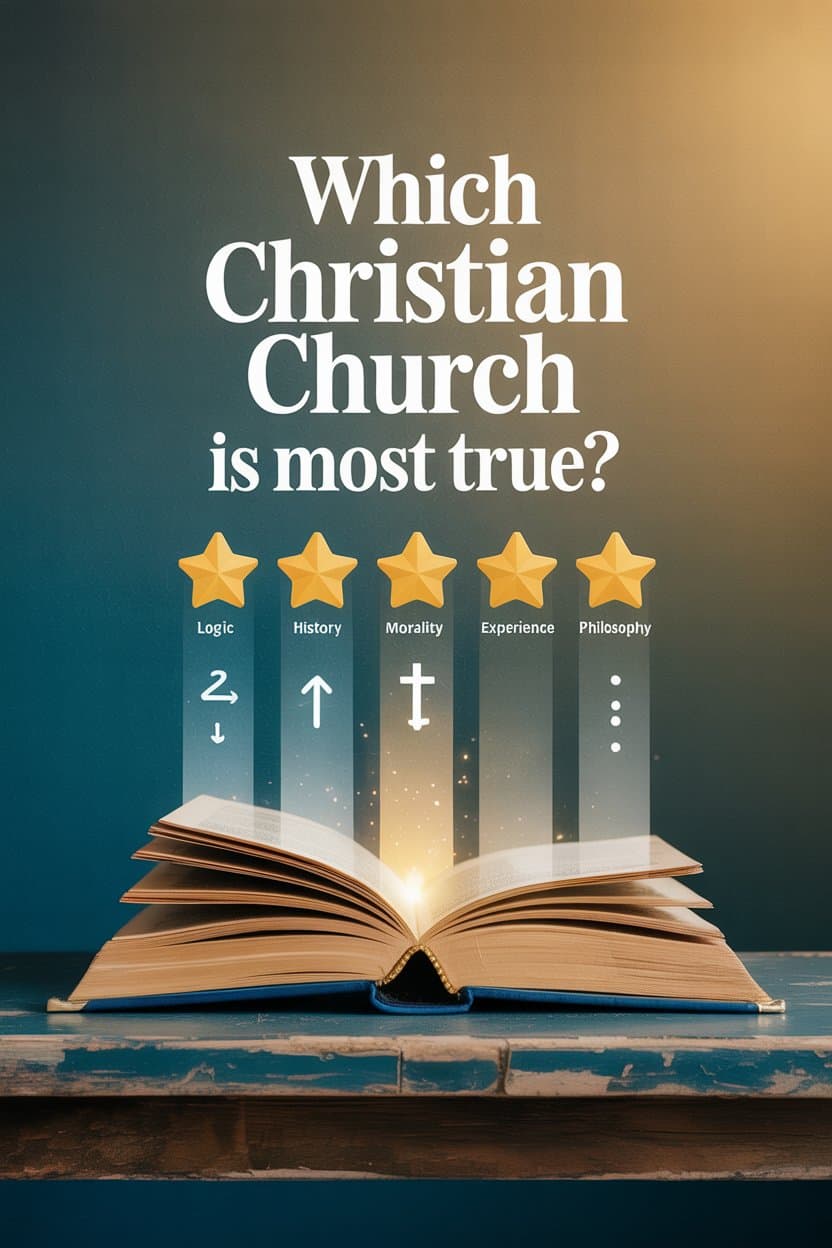Many people today wrestle with one of the most important questions of life: “Which Christian church is most true?”
Recently, I explored what I call the Absolute Truth Seeking framework: If a perfectly rational mind examined the major Christian paradigms, how would they compare? The goal was simple: If a purely rational mind had access to all human knowledge, how would it evaluate Christianity?
The results were both fascinating and faith-promoting. Let’s walk through the findings together.
🧠 Part 1: Rational Comparison of the Three Major Christian Paradigms
1. Catholicism – Apostolic Continuity
Strengths:
- Strong claim of apostolic succession through papal lineage.
- Instrumental in canonizing the New Testament (~4th century).
- Rich theological and philosophical tradition (Aquinas, Augustine).
- Deep mystical tradition and sacramental grace.
Weaknesses:
- Some doctrines (papal infallibility, Marian dogmas) lack clear NT grounding.
- Historical abuses such as indulgences and the Inquisition.
- Limits on personal revelation.
Scores:
Logical ★★★★☆ | Historical ★★★★★ | Moral ★★★☆☆ | Experiential ★★★★☆ | Philosophical ★★★★★
2. Protestantism – Sola Scriptura (“Scripture Alone”)
Strengths:
- Born as a reform against Catholic corruption.
- Emphasizes direct access to Scripture and a personal relationship with Christ.
- Revival movements brought mass conversions and renewed zeal.
Weaknesses:
- Doctrinal fragmentation (40,000+ denominations).
- Inconsistent theology; some branches drift toward relativism.
- Less cohesive long-term authority structure.
Scores:
Logical ★★★☆☆ | Historical ★★★☆☆ | Moral ★★★★☆ | Experiential ★★★★☆ | Philosophical ★★★★☆
3. The Restoration (LDS) – Apostasy and Renewal
Strengths:
- The Church of Jesus Christ of Latter-day Saints claims divine restoration of lost apostolic authority through modern prophets (Joseph Smith, 1820s).
- Doctrinal uniqueness: modern revelation, open canon, eternal progression, strong family-centered theology.
- Philosophical innovations: clearer theodicy, rejection of creation ex nihilo.
- Millions testify of spiritual confirmation of the Book of Mormon.
- Strong missionary zeal and community support.
Weaknesses:
- Archaeological debates around the Book of Mormon.
- Some doctrines differ from traditional Christian philosophy.
Scores:
Logical ★★★★☆ | Historical ★★★☆☆ | Moral ★★★★★ | Experiential ★★★★★ | Philosophical ★★★★★
🏆 The Rational Verdict
When measured purely on coherence across logic, history, morality, experience, and philosophy, the analysis concluded:
➡️ The Church of Jesus Christ of Latter-day Saints (Restoration model) emerges as the most compelling and coherent option.
It unifies what Catholicism and Protestantism each attempted but could not fully achieve:
- Apostolic authority was lost (as Protestants sensed).
- But not forever—it was divinely restored (as Catholics hoped).
🙏 Part 2: Why Reason Alone Isn’t Enough
As compelling as rational analysis may be, the Bible reminds us that ultimate truth is not discovered by logic alone.
- Spiritual truth is spiritually discerned.
“The natural man receiveth not the things of the Spirit of God… because they are spiritually discerned.” (1 Corinthians 2:14) - God commands us to ask, not just analyze.
“If any of you lack wisdom, let him ask of God…” (James 1:5) - Truth comes by revelation, not just reason.
“Ask, and it shall be given you; seek, and ye shall find…” (Matthew 7:7) - Faith is a gift, not a conclusion.
“By grace are ye saved through faith… it is the gift of God.” (Ephesians 2:8)
👉 In other words, logic may point us in the right direction, but only the Spirit of God can confirm truth to the heart.
📖 A Personal Invitation to Seek
The Book of Mormon teaches this same principle in a powerful passage:
“And when ye shall receive these things, I would exhort you that ye would ask God, the Eternal Father, in the name of Christ, if these things are not true… he will manifest the truth of it unto you, by the power of the Holy Ghost. And by the power of the Holy Ghost ye may know the truth of all things.”
— Moroni 10:4–5
✅ Final Thoughts
A rational framework can clear away confusion, expose weaknesses, and highlight strengths. But it cannot:
- Awaken faith
- Heal a soul
- Forgive sin
- Reveal God’s voice
For that, each seeker must not only analyze but also pray. Step 1 is reason. Step 2 is revelation.
If you are searching for truth, I invite you to not just study about Christ’s churches but to ask God yourself. As you do, He will guide you by His Spirit.
📩 Free Resource for Seekers
For further study, download our free booklet:
“10 Promises Jesus Makes for the Last Days”
👉 [Download Here]
🎶 A Song to Inspire You
While you reflect on this message, take a few minutes to listen to Two Witnesses Declare His Light. It beautifully captures the harmony between the Bible and the Book of Mormon.
👉 Click here
I hope this gives you food for thoughtful and prayerful consideration for yourself or to share as you feel inspired to do so.
Don Keith

